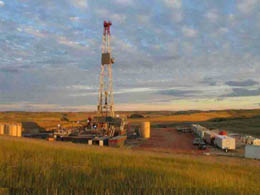Energy and the environment are often at odds. As America’s energy production reaches record levels, controversies over the environmental impacts of energy development dominate the headlines. More often than not, the result is costly litigation and lengthy political battles.
The debate is particularly intense on Colorado’s public lands. In the past five years, nine of every 10 acres proposed for oil and gas leasing in the state have been formally challenged. Plans to sell leases in the North Fork Valley and the Dinosaur area of Western Colorado provoked waves of protest last month. In response, the Bureau of Land Management deferred the sale of the controversial leases.
Although some conservationists celebrated the delay, many remain wary. During his State of the Union address last month, President Obama proposed to accelerate oil and gas permitting on federal lands. It’s clear that battles over energy development and environmental protection are not going away any time soon.
Recent agreements between energy developers and environmental groups suggest that it doesn’t have to be this way. Competing groups are increasingly working together to avoid costly litigation and reach compromises over energy and environmental values.
In December, the Trust for Public Land worked with Plains Exploration and Production Co. to buy out 58,000 acres of the company’s oil and gas leases in Wyoming’s Hoback Basin. The $8.75 million deal secures important environmental and recreational values without litigation or political controversy. The Trust simply recognized leaseholder rights and compensated the company for the value of the leases.
In 2010, the Southern Utah Wilderness Alliance and the Bill Barrett Corporation reached an agreement over a plan to drill for natural gas in Utah’s Nine Mile Canyon. The two groups – formerly political adversaries – negotiated a compromise that allows for low-impact energy development with careful attention to the area’s wilderness qualities and cultural resources.
But compromises such as these are unusual in Colorado and much of the West. Currently no general framework exists to promote cooperation over competing energy and environmental values on public lands. The retirement of leases in the Hoback Basin required supportive legislation in Congress. The rules that govern public lands can discourage or even prevent collaboration between energy developers and conservationists. Too often, the success of either side depends on political forces, which ebb and flow with each passing administration.
Last year, conservationists in Colorado proposed to buy leases from energy companies on the Thompson Divide near Carbondale. Their reasoning was simple: The area’s value for anglers, hikers, and hunters outweighed the value of the oil and gas beneath the land. The plan, however, lacked the necessary approval from Congress. Today, no deal has been reached, and plans to drill are moving forward.
If compromises are to succeed on public lands in Colorado and across the West, creative solutions are needed. Federal leasing rules that allow contracting between energy developers and conservationists on public lands would promote voluntary agreements while respecting the rights of leaseholders. Regulatory changes to the environmental review process that facilitate direct negotiation would encourage groups to resolve their differences. And market-based leasing reforms that open up the bidding process and allow for conservation leasing would provide an alternative to the controversy and litigation that characterize public lands today.
Our system of public land management was designed for an earlier era. As environmental values continue to collide with energy development on federal lands, it’s time to develop a framework that promotes cooperation instead of conflict.
Read the original article at the Denver Post.




